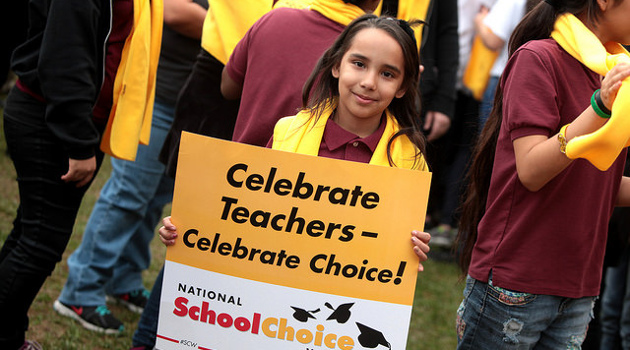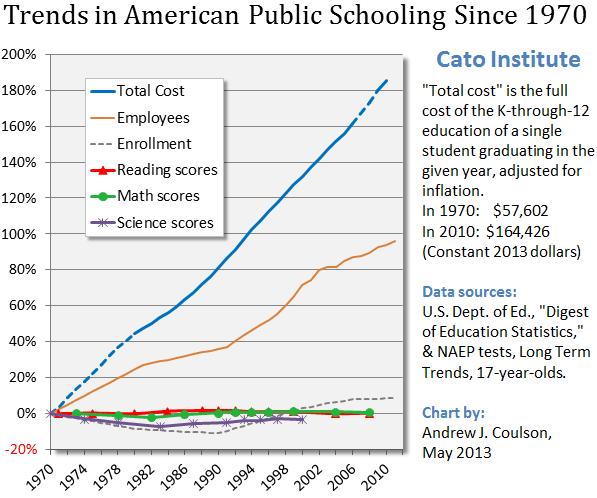If Winston Churchill was commenting on America’s government schools instead of the Royal Air Force, he would have said, “never have so many paid so much to achieve so little.”
Which is one of the messages in this new video from Reason.
I won’t keep anyone in suspense.
The message of today’s column is that government schools are becoming ever-more expensive while producing ever-more dismal outcomes.
As a nation, we have two choices.
We can continue to pour more money into monopoly, government-run systems that never produce better results.
Or we can learn from the evidence and harness the benefits of competition and innovation with school choice.
Let’s look at some more data and research.
In a study published by the National Bureau of Economic Research, Dennis Epple, Richard E. Romano, and Miguel Urquiola were largely agnostic on the desirability of choice.
But their research included some very favorable analysis.
We review the theoretical, computational, and empirical research on school vouchers, with a focus on the latter. …multiple positive findings support continued exploration. …for some subgroups or outcomes, vouchers can have a substantial positive effect on those who use them. …Evidence on both small scale and large scale programs suggests that competition induced by vouchers leads public schools to improve. … The most robust finding is that voucher threats induce public schools to improve. …In addition, recent evidence from small-scale experiments in the United States finds substantial gains in years of school for recipients… More encouraging results on the effect of small-scale programs come from developing countries. …interesting evidence comes from India. While vouchers there delivered modest test-score gains, they did so at one-third the cost per student of public schools. …In the case of Sweden’s large-scale voucher program, …recent work features evidence of significant gains… Recent research also tends to support the finding that voucher competition has improved the performance of public schools.
Since I’ve written about choice programs in nations such as Canada, Sweden, Chile, and the Netherlands, I’m glad the study mentioned some of the international evidence.
Moreover, I’ve also noted that proponents of school choice have been gaining ground.
Francis Suarez, the Mayor of Miami, wants more progress. A National Review article he co-authored with Corey DeAngelis makes the case for expanded options.
School choice is the civil-rights issue of the 21st century. Choosing the right school opens opportunity, it shapes success, it prevents failure, and it unleashes economic opportunity. …We believe the best way to improve our schools and invest in our future is to expand parent-driven school choice. …Miami has always led on school choice. In 1996, T. Willard Fair, the president of the Urban League of Greater Miami, partnered with Governor Jeb Bush to start Florida’s first charter school in Miami’s Liberty City neighborhood. …Since then, Miami-Dade County has launched 140 charter schools, serving more than 70,000 students, and more than 440 private schools that serve tens of thousands of students with school-choice scholarships. Miami has done well, but now we need to do better. …Moreover, the students who benefit from increased school-choice options are overwhelmingly from historically discriminated-against communities. In a 2019 study, the Urban Institute found students using the Florida Tax Credit Scholarship for lower-income families — 24,502 students in Miami-Dade used them last year — are far more likely than their public-school peers to enroll in colleges and earn bachelor’s degrees. And a 2020 study published by the National Bureau for Economic Research found that, as that same program grew, students in the district schools most affected by competition saw higher test scores.
The moral of the story is that school choice is a win-win for taxpayers and students.
Now let’s shift to the politics of school choice.
That normally means focusing on the baleful role of teacher unions, which place their personal self interest above student outcomes.
But there’s also the red-vs.-blue dynamic. In a report for the American Enterprise Institute, Jay Greene and Lindsey Burke analyze some of the challenges of trying to enact bipartisan choice legislation.
…in their quest for broader support, choice proponents have conceded to Democrats’ policy demands that ultimately weaken the options available to families: limited student eligibility, heavy-handed standardized tests and regulations, caps on scholarship amounts and student participation, and admissions regulations. Not only has that approach weakened many school choice programs, but it doesn’t appear to have actually won Democratic policymakers’ support. It may have even alienated Republican policymakers who were on the fence about supporting school choice. …Any Democratic support has been for modest or heavily regulated programs, such as the voucher program in Louisiana. The Louisiana voucher program suffers under a mountain of regulations that has discouraged private schools from participating, so much so that only one-third of the state’s private schools will accept the vouchers. …What does this all mean for private school choice proponents? It means supporters should not be afraid to make what is likely our most compelling case: that education freedom is fundamentally about enabling parents to choose learning environments that align with their values. …choice proponents should embrace and be vocal about school choice allowing families an escape hatch from government schools pushing an agenda that runs counter to their values. In other words, choice proponents should be unafraid to appeal to Republicans. …proponents have not made the cultural case for choice to the Republican base, for fear of losing Democratic legislative allies, who, it turns out, weren’t really there to begin with.
I’m a policy wonk rather than political pundit, so my only comment is that proponents shouldn’t give up on bipartisanship.
There’s new legislation in Georgia to enable choice and it has several Democratic cosponsors. If enacted, this could be even bigger news than last-year’s victory in West Virginia.
And I’ve already lauded the powerful words of Justin Wayne, a Democratic member of Nebraska’s legislature.
Speaking of politics, another complication is that charter schools (a type of choice in the government system) may undermine private schools.
Christopher Bedford explains this problem in an article for the Federalist.
Search the Lehigh Valley papers and you’ll find Catholic school after Catholic school closing down. In March 2018, Our Lady Help of Christians in Allentown closed its doors. In June 2020, Sacred Heart School in Bath and St. Francis Academy in Bally shut down. And last May, Trinity Academy in Shenandoah became the latest victim. …Charter schools are booming in Pennsylvania. …enrollment at charters rose by 25,000 last year; about 10 percent of all children in the state are enrolled in them. There are at least 14 charter schools in the Lehigh Valley region so far. …Often, in fact, the arrival of a charter is the death knell for a parochial school. In New York state, a 2012 study found that for every charter school that opened, a parochial school closed. …This is the kind of mutilated, self-defeating “victory” we see on the right far too often. Democratic teachers unions were weakened, and public school bureaucrats faced some small level of competition. …But in the big picture, parents and their children are still at the mercy of a government bureaucracy… Still, for a lot of parents, the choice is simple: They know public schools are poisonous, and now they have an alternative that doesn’t cost them a dime in tuition. And so, charter schools are booming, while parochial schools are slowly withering and dying.
This creates a quandary.
Charter schools are better than regular government schools.
But it would be a Pyrrhic Victory if the expansion of such schools undermines the vitality of private schools.
P.S. Many rich folks on the left believe in private schools, but only for their own kids.
P.P.S. There’s also evidence that school choice is better for children’s mental health since it’s associated with lower suicide rates. That’s a nice fringe benefit, much like the data on school choice and jobs.
P.P.P.S. Getting rid of the Department of Education would be a good idea, but the battle for school choice is largely won and lost on the state and local level.
———
Image credit: Gage Skidmore | CC BY-SA 2.0.






